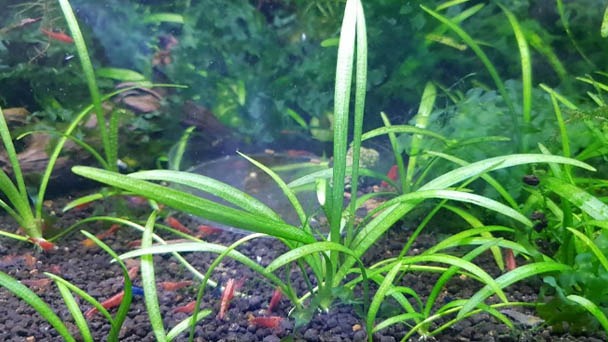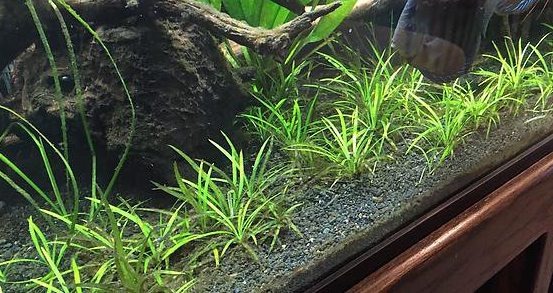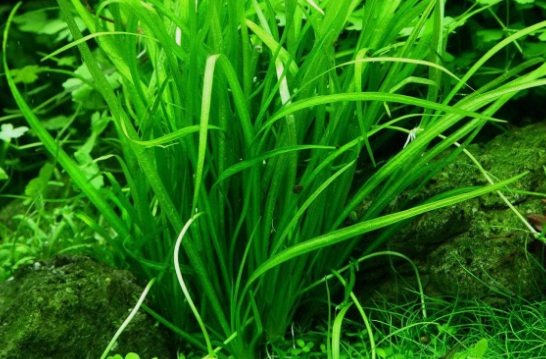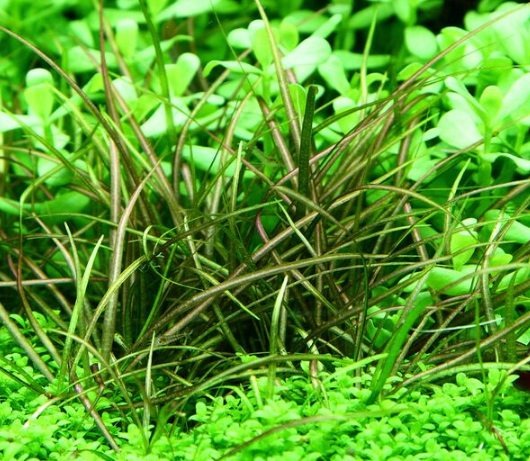Pygmy Chain Sword: Plant Care & How to Propagate
Written by Ivy
Dec 30 2022

In the nano tank aquascaping community, pygmy chain sword is a highly prized plant that is cherished for its many advantages, which include offering a place for wildlife to hide, producing a sustainable food source, and improving water quality. For aquarists of every skill level, from novice to expert, pygmy chain sword makes a great carpeting plant.
Pygmy Chain Sword Overview
| Family Name: | Alismataceae |
| Common Name: | Narrow-leaf chain sword |
| Origin: | South America |
| Color: | Dark to light Green |
| Size: | 10 cm or 4 inches |
| Growth Rate: | Rapid |
| Care Level: | Beginner |
| Lighting: | Moderate to high |
| Water Conditions: | Tolerates a variety of water temperatures and conditions |
| Minimum Tank Size: | 5 gallons |
| Supplements: | High-quality aquarium fertilizers |
| Placement: | Bottom of the aquarium so it forms a green carpet |
| Propagation: | Produces runners, self-propagation |
| Compatibility: | Does well with a variety of low-growing aquatic plants |
Pygmy Chain Sword Appearance

With broader leaves and a thinner tip, the pygmy chain sword resembles an aquatic version of grass and ranges in color from a light green to a lush dark green. The aquarium's bottom turns into a vibrant green carpet as it grows quickly and low. With thin blades that enlarge toward the ends, the pygmy chain sword resembles a clump of grass. This plant doesn't get very tall; under ideal lighting, it only reaches a maximum height of 10 cm (4 inches), which prevents it from taking over an aquarium.
Pygmy chain sword produces runners that begin small and quickly grow to full size, spreading and multiplying. The plant has a main root from which a number of grass-like blades sprout randomly. The blades can be trimmed to your preferred size if you would prefer to have them all at the same height and length. Due to its rapid growth, you will need to maintain this routine. The pygmy chain sword plant, also known as "under water grass," gives an aquarium an exceptional appearance with its distinctive features and growth that is not present in other aquatic plants.
How to Care for Pygmy Chain Sword
It doesn't matter if you are an experienced aquarium plant caretaker or are still learning the ropes because pygmy chain swords are suitable for all levels of aquarists. Pygmy chain swords require some unique care practices to keep them healthy and to maintain their lush and vibrant green coloration, despite not being as hardy as some other aquarium plants.
Tank/aquarium Size
Pygmy chain swords need at least a 5-gallon aquarium because they spread horizontally on the foreground of the tank; otherwise, the tank might not be able to support the growth and rapidly growing runners when the plant propagates. The carpeting formation can make them appear unattractive in small aquariums as well.
Water Temp and PH
The 68°F to 84°F temperature range is ideal for pygmy chain swords, making tropical and cold-water aquariums the perfect home for them. This plant is adaptable to variations in temperature and pH because they do prefer neutral water with a pH of 6.2 to 7.5.
Substrate
The best conditions for pygmy chain sword growth are fine gravel filled to a depth of at least 2 inches for proper rooting. The nutrient-rich aquarium sand is one of the best choices. Pygmy chain swords benefit from supplements like CO2, fertilizers, and root tabs, but it's best to avoid overdoing supplementation, and dosage depends on tank size and the number of pygmy chain swords in your aquarium. Make sure to add enough substrate to support healthy root development.
Plants
Plants that do not block the pygmy chain sword's light source, like floating plants, are good companions. Since they typically grow in a way that blocks out some of the light needed for survival, they are incompatible with middle ground overhanging plants. Select slow-growing broad leaf plants rather than plants with close leaves.
Lighting
Pygmy chain swords prefer moderate to high lighting, though more light makes them grow more quickly. Low lighting conditions are not good for them; they will lose color, grow slowly, and not reach their full potential. To light the tank above (do not place an aquarium in direct sunlight), you can either choose bright natural lighting or purchase artificial lighting.
Filtration
Pygmy chain swords are fantastic plant filters and water purifiers. They easily take up ammonia, nitrites, and nitrates to use for growth, which benefits you by maintaining the aquarium's water quality and lowering the need for water changes. Given how well they biologically filter an aquascaped nano tank, they are even used in shrimp tanks that are not filtered.
Pygmy Chain Sword Propagation
Pygmy Chain Sword will self-produce suckers and runners along your substrate surface. Daughter plants are produced as a result, and they develop in close proximity to their parents.
Daughter Dwarf Chain Swords should be divided from the parent once they have reached half their parent's size because they will have developed enough root systems to stand on their own.
Daughter plants should be cut at the runner and gently pulled to lift off their roots if you want to remove them.
Planting Tips
Pygmy chain swords need to be rooted properly, so they should be planted in either sand or fine gravel that has been leveled to at least 2 inches. To maximize the growth rate and health of your plant, it is a good idea to add fertilizers and root tabs before planting pygmy chain swords. Make sure to cover the roots when you plant in your aquarium, leaving only the stem and leaf blades exposed. This guarantees that your pygmy chain sword can root properly, preventing it from becoming slack and then floating away from its position.
Although plant weights are not typically found in pet stores, they are widely available online. If you find that they do not appear to root in the substrate, you can try using them. Planting shouldn't be done in a tank that doesn't get much light or that is crowded with a lot of different plants because they may block out the light and too many plants will compete for nutrients and space.

Background Information
The Pygmy Chain Sword originated in the marshlands of the Americas. The Pygmy Chain Sword, which is still widely used today, was first discovered in North, Sound, and Central America. Soon after, botanists and aquarium enthusiasts discovered it.
It is now spread across many States and can be seen growing partially or completely submerged in water.
The plant's scientific name is Echinodorus Tenellus, though it might also be called by other names such as Alisma Tenellum, Dwarf Chain Sword, or Hellenium Tenellum. Due to the plant's hardiness and moderately quick growth rate, aquarists use and propagate it today. It is one of the best carpet plants to have, especially if you have a medium to large-sized fish tank.
The 5 Benefits of Having Pygmy Chain Sword in Your Aquarium
1. Water Purification
By absorbing ammonia and nitrates to help them grow, pygmy chain swords are excellent biological aquarium filters that keep water parameters under control. This maintains the water's quality and helps to contain harmful parameters that might harm the aquarium's inhabitants. When it comes to regulating the levels of ammonia and nitrate in the tank, aquatic plants, particularly pygmy chain swords, are generous.
2. Hiding Place
The aquarium's inhabitants, particularly fry, shrimp, and young apple snails, can hide out safely and securely in the 4-inch grass. Larger fish are seen sleeping in the grass at night as they feel safe there.
3. Grows on the Foreground of the Aquarium
This has the benefit of preventing them from taking over the tank the way other aquarium plants often do. On the bottom of your aquarium, they develop into a thick carpet of greenery and prevent it from looking crammed with live plants.
4. Propagates on Its Own
Pygmy chain swords seem to grow well on their own and spread runners throughout the tank as well as produce seeds when mature, multiplying without your help.
5. Cost Effective
Pygmy chain swords are a cheap aquatic plant, available both online and at pet stores.
Concerns About Pygmy Chain Swords
Due to the structure of these plants, it can be challenging to see the smaller invertebrate aquarium inhabitants because they will likely hang out within them because they feel safe and secure. Unless you look into the aquarium from the top, you won't be able to see these inhabitants very much. If you don't want pygmy chain swords to cover the entire foreground of the tank, regular trimming and propagation control may be necessary. Pygmy chain swords grow quite quickly. Without additional supplements like C02, root tabs, or specialized aquarium fertilizers, they also don't seem to grow well.

Pygmy Chain Sword and Compatible Tankmates
The Pygmy chain sword should be kept with calm freshwater fish and invertebrates. It's crucial to have species that will search through the thick carpet's debris, algae films, and tiny food particles.
Fish
Marsilea hirsuta is best kept with small, peaceful community fish such as Bleeding heart Tetra, Neon Tetra, Mollies, Killifish, Swordtails, White Mountain Minnows, Zebra Danio, Cherry Barb, Sunburst Platy, Endlers, Mollies, Otocinclus Catfish, Pygmy Cory Catfish,
Shrimp
Not to be overlooked are invertebrates. You should take into account species like crystal red shrimp, blue bolt shrimp, and caridina cf. that prefer the same water characteristics (mostly pH). babaulti, etc.
Freshwater Snails
Again, it is not advisable to keep ornamental snails for an extended period of time in a tank with a low PH. It will harm their shell. Any snail or dwarf shrimp you like can be kept, though, if your pH is close to 7.0. For instance, Japanese trapdoor snails, Ramshorn snails, Nerite snails, Malaysian Trumpet snails, Black Devil snails, Asolene spixi, Rabbit snails, etc.).
Final Thoughts
You are able to take good care of the pygmy chain sword aquarium plant if you have mentally checked off the majority of the care requirements. A lovely green carpet will be added to the foreground of your tank thanks to its vivid green and lush coloration. The great biological filtration that pygmy chain swords provide, among their many other valuable features, can significantly aid in maintaining the health of your aquarium.
This is a great beginner and simple-to-care-for aquarium plant because the advantages outweigh the disadvantages. To prevent the plants from competing for nutrients and light, always make sure new aquatic plants are compatible with the ones you already have.
Latest Updated
- Benefits of Bugleweed - 7 Science-backed Health Benefits
- Bugleweed Dangers & Side Effects - Is It Poisonous?
- How to Plant Evergreen Trees - What You Should Know
- When to Plant Evergreens - Grow Guide for Evergreen Trees
- 12 Wonderful Evergreen Shrubs for Your Garden
- 12 Popular Evergreen Plants with Pictures for Beginners
- When And How To Prune A Lilac Bush Like a Pro
- How to Grow & Care for Lilac Vine (Hardenbergia Violacea)
- Japanese Lilac Tree (Syringa Reticulata) Care & Propagation Guide
- Shumard Oak Pros and Cons - What to Know
Popular Articles
- Winter maintenance of Antirrhinum Majus
- How to Grow Terminalia Mantaly Tree
- How to Grow and Care for Crossostephium Chinense
- How to grow Antirrhinum Majus in spring
- Peristeria Elata (Dove Orchid) Profile: Info & Care Guide
- Underwatered Snake Plant (Sansevieria Trifasciata) - Signs And How To Fix
- How to Care for Brazilian Jasmine Plant (Mandevilla Sanderi)
- How to Grow & Care for Graptopetalum Purple Delight in Summer
- Rosa Chinensis (China Rose): Plant Growing & Care Tips
- How to Care for Baby Sun Rose (Aptenia Cordifolia)